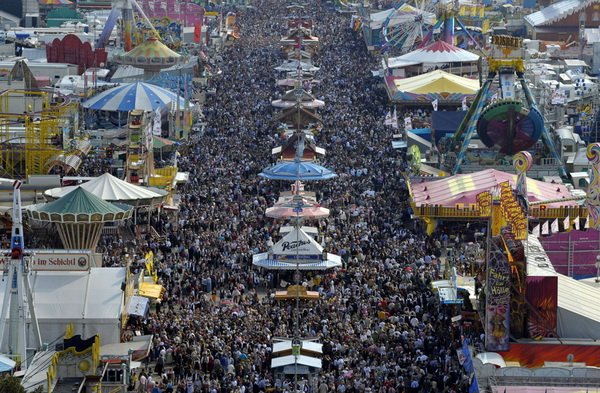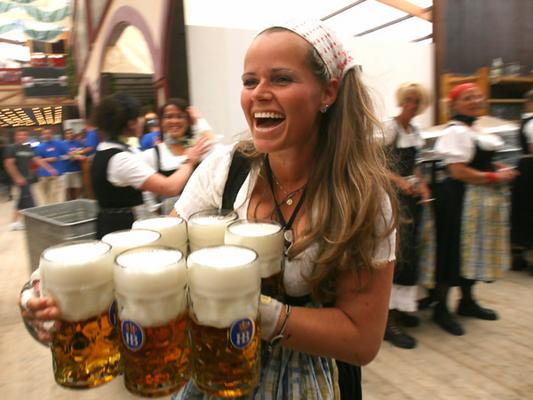“O’zapft is!” Oktoberfest 2012 starts with beer and rain
Oktoberfest 2012, the 179th edition of the world’s most famous beer festival, has begun on September, 22, at the Theresienwiese fairground in Munich (München), Germany.
September, 22 is also the day of autumnal equinox in the northern hemisphere, which brought a heavy rain to Munich.
At the “Schottenhamel” beer tent, Mayor Christian Ude performed the traditional ritual and inserted the first tap into the first keg of Oktoberfest-beer. “O’zapft is!” (“It is tapped!”), he cried into the microphone and wished everyone a peaceful Oktoberfest. The traditional opening ceremony also included a 12-gun salute.
The first mug of beer was offered to the Bavarian prime-minister Horst Seehofer and after that all the other beer tents could start selling beer. The event was broadcast on live TV and via the Internet.
According to the official website of the Oktoberfest, “The Schottenhamel tent, which in 1867 was just a small beer booth with 50 seats, has become the largest Wiesn tent with circa 10,000 seats. The Schottenhamel is the favourite hunting ground for Munich’s young people, who meet there to drink and party.” The Wiesn is the festival area.

Oktoberfest 2012 has started on September, 22, in Munich, Germany. The Wiesn, festival area, has over 26 hectares.
With around 12,000 waiters and waitresses expected to serve more than seven million “mass” (liter-sized glasses) in 35 tents, Oktoberfest 2012 will be an enormous party, stretching on over 65 acres (26 hectares).
The German folk fest features beer tents, oompah bands (a form of popular German music), sales booths, souvenir shops, carnival rides and restaurants serving traditional delicacies.
There are six different breweries that provide their own Oktoberfest beers, Augustinerbrauerei, Hacker-Pschorrbrauerei, Löwenbrauerei, Paulanerbrauerei, Spatenbrauerei and Staatliches Hofbräuhaus.
Only Munich beer from the proven traditional Munich breweries which satisfy the Munich purity standards of 1487 and the German purity standards of 1906 may be served.
This year, a “mass” will be sold between 9.10 euros and 9.50 euros ($12.30), a rise of 3.9 percent since last year, and of 43 percent over a decade.
Beer is the major source of income at Oktoberfest. In 2011 over 7.5 million liters of beer were sold, setting an all-time beer record.
Bavarian delicacies such as radishes, obatzda (specially garnished cream cheese), sausages and roast chicken or spicy fish grilled on a skewer will be served with the beer. Another Wiesn specialty is the ox roasted on a spit at the Ochsenbraterei.
Over six million drinkers will consume tens of thousands of giant soft pretzels, pork, dumplings and other delicacies. Last year, party-goers ate 118 oxen, 53 calves and thousands of chickens.

German waitress wearing traditional outfit.
Oktoberfest is also a traditional German folk festival, a showcase for Bavarian culture.
Women wear a traditional outfit, long Dirndl, a bodice, a skirt, a blouse and an apron, lace-up dresses with plunging necklines, and men wear lederhosen or suede knee breeches. Also, the revelers take part in processions of regional costumes.
At the opening of the Oktoberfest there is a ceremony of the entry of the festival hosts and breweries, which has been the same since 1887. The families of the festival arrive in coaches adorned with flowers, along with the bands, waitresses on decorated carriages. The procession is led off by the “Münchner Kindl” – Munich’s symbolic figure – on horseback, followed by the festival coach of the Lord Mayor.
The procession of folklore and marksmen groups takes place on the first Sunday of the Oktoberfest. About 9,000 persons from Germany, Austria, France, Italy, Norway, Poland and Switzerland participate in this seven-kilometer long parade. There are people in historical uniforms, marksmen, folklore groups, local bands and thoroughbred horses. This procession was held for the first time in 1835 on the occasion of the silver wedding anniversary of Ludwig I and Therese of Bavaria.
A big band open-air concert of all Oktoberfest bands with some 300 musicians takes place on the second Sunday of the festival. For the grand finale of the Oktoberfest on the last Sunday, some 60 marksmen give a farewell salute.
Initially intended as a celebration to commemorate a royal wedding, the marriage of the prince of Bavaria, Ludwig I, to Princess Therese of Saxony-Hildburghausen, Oktoberfest began in 1810.
The event was cancelled during two cholera outbreaks, two world wars, Napoleon’s invasion of Bavaria and the hyperinflation of the 1920s.
The festival has evolved into a holiday celebrating all things German, especially the brewing of märzen, the traditional Oktoberfest beer.
Oktoberfest has been adopted in places near and far from its Bavarian home, and is held across entire Germany and also in Australia, Brazil, Canada, China, Russia, and the United States.
Oktoberfest 2012 runs from September 23 to October 7.
